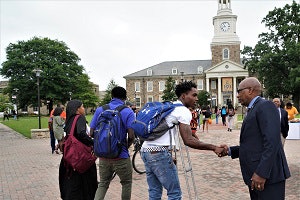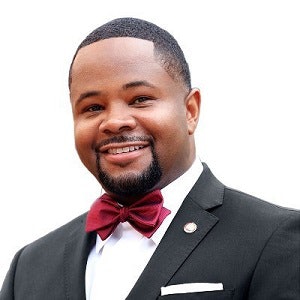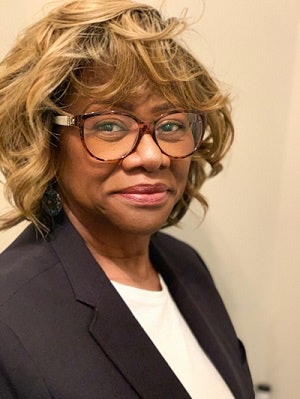Starting today, Diverse will feature occasional news-roundups and interviews focused on historically Black colleges and universities (HBCUs) and other minority-serving institutions, as campus leaders plot a course for teaching, learning and working during the pandemic. This first installment takes a look at plans from Morgan State University in Baltimore, Maryland; Tennessee State University in Nashville, Tennessee; and Claflin University in Orangeburg, South Carolina.

In March, the COVID-19 pandemic forced campuses across the country to evacuate and abruptly send faculty and students to a hodgepodge of remote and virtual teaching and learning spaces. The pandemic has disrupted higher education institutions, but its toll on the nation’s historically Black colleges and universities (HBCUs) and other minority-serving institutions (MSIs) has been particularly severe.
Today, as those in charge of HBCUs and MSIs grapple with likely enrollment shortfalls and other unprecedented economic and public health burdens fueled by the pandemic, they must also decide how and whether to reopen in the fall. These considerations come as many Southern states, home to most HBCUs, show jumps in COVID-19 cases. Facing so many unknowns, most campus plans that are emerging are purposely tentative and incomplete. But the “preparedness and readiness” plan the president of Morgan State University issued earlier this month fills in more of the gaps than most.
Morgan State University: ‘We Are Encouraged’
At Morgan State University (MSU), efforts to re-open the campus began on June 8 with the return of its physical plant staff. Cleaning and preparing the campus is the first step in a multi-phased plan to re-open the campus in the fall and resume residential life, president Dr. David K. Wilson said in a statement to his university community.
 Morgan State University president David K. Wilson greets students on campus pre-COVID-19
Morgan State University president David K. Wilson greets students on campus pre-COVID-19(Photo: Morgan State University)
Despite facing a new academic year made uncertain by the pandemic, “we are encouraged,” Wilson told Diverse. Surveys of current students are among some recent indicators that tell Wilson his students “desire to return to campus” and want to resume face-to-face learning. But when tuition is a key driver and those students are still remote, what also matters now is ensuring that new fall applicants say “yes” to Morgan. With a little over two months to go before MSU plans to re-open on Sept. 5, Wilson told Diverse the university continues “to assess and process our fall applications, [and] at present, the best-case projections are that the enrollment number remains flat.”
Looking forward, though, the MSU community will be making a fall comeback in this order, according to the plan: physical plant staff (Phase 1); student-athletes (Phase 2); some regular staff (Phase 3); faculty (Phase 4); and students (Phase 5).
Leading during a pandemic has been “a challenge,” said Wilson who appointed a “Campus Reopening & Readiness/Preparedness Committee” in April and gathered feedback from students, staff and faculty to inform the detailed plan he rolled out for “health and safety, instruction/academics, campus life and our people.”
These are some highlights of the plan for students and campus life:
Fall classes will begin on Sept. 9, and the last day for face-to-face classes will be Nov. 25, a day before Thanksgiving break. Following the holiday break, remaining instruction will be conducted remotely until classes end on Dec. 15.
On-campus housing capacity will be reduced by 31% as many multi-occupancy rooms are converted to singles or reconfigured for social distancing. Since fewer dorm rooms can be occupied, MSU is contracting with nearby hotels and apartment buildings to house students. But the new plan informs residential students that no housing refunds will be issued when students “vacate campus housing at the end of face-to-face instruction” in November.
Claflin University: Ready With Masks, Thermometers and COVID-19 Testing
As it prepares for the fall, Claflin University announced on June 5 its own phased-in approach for faculty and students. Phase one will kick off July 6 with a focus on faculty and staff. Some “will continue to work remotely” until they can “safely reintegrate back to campus,” with others on a staggered schedule, president Dr. Dwaun J. Warmack said in a letter to the Claflin community.
 Dr. Dwaun J. Warmack
Dr. Dwaun J. Warmack“Early August” is when Claflin expects to open for the fall and welcome its students, but the big job of preparing for their return is slated for phase two which begins on July 20. It’s safety first for the transition back, Warmack said. The university plans to make available masks and thermometers and possibly offer COVID-19 testing “to welcome our campus community safely.”
Tennessee State University: From Lockdown to Re-opening, ‘Not so fast’
In May, Tennessee State University (TSU) announced plans to re-open in the fall. In the new teaching and learning normal, “the use of larger classrooms and hybrid in-person and online course presentations” are among the plans, with anticipated stepped-up safety measures, public health guidance and social distancing standards. During the COVID-19 closure, Dr. Wendelyn Inman, professor and director of public health programs in the College of Health Sciences, has been leading the university’s re-opening committee.
 Dr. Wendelyn Inman. (Photo: Tennessee State University)
Dr. Wendelyn Inman. (Photo: Tennessee State University)Inman, an infectious disease control expert, says “not so fast” to campuses considering bounding out of COVID-19 lockdown to bring all students and faculty back to campus in the fall. Plans for universities’ re-openings and easing of restrictions must be done in phases, “not all the way.”
Here’s why: “Our students come from all over the world and from so many different backgrounds, and for some, it is not feasible to work remotely long term. TSU is their home, their jobs are here,” says Inman who was formerly the chief of epidemiology for Tennessee state. “Let some students come back to campus, especially if they need a place to stay, and a place to study. Provide them with essential tools to complete their education, and for many of them that includes a safe place to live and from which to work.”
For returning TSU students and their families, there was some good financial news, too. In early June, TSU president Glenda Glover announced a tuition freeze for the 2020-2021 academic year. “The effects of the COVID-19 pandemic coupled with the current economic downturn would pose an additional hardship for our student population and their families.”















